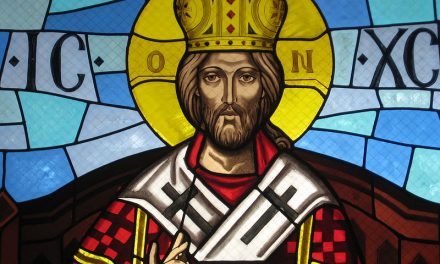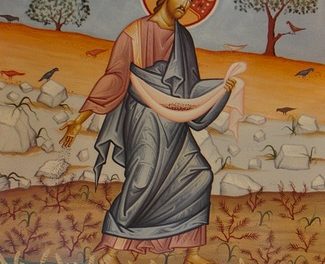Exodus 22: 20-26
Psalm 18
1 Thessalonians 1: 5c-10
Matthew 22: 34-40
Oftentimes it is difficult to find one common thread that connects each of the readings for a given week, but sometimes with a little digging around it is possible to see some themes emerge. What I would like to suggest with this week’s readings is that they can all be tethered to the first commandment of the decalogue. There is both text-critical and thematic evidence for doing so.
The first reading is from Exodus chapter 22 in which the Mosaic law, first given at Mount Sinai in chapter 20, is being expounded upon. This is the part of the Hebrew Bible during which most reader’s eyes start to glaze over as we discuss what to do with a grape that falls on the East side of a hill on the Sabbath during a thunderstorm (this is obviously a hyperbolic example). But something that always amazes me each time I am exposed to rabbinic commentaries, or to the first Christian exegetes of the early Church (like Origen or the Cappadocian fathers, for example) is that every single letter of the Word of God can be ripe with depth of meaning, if one is but willing to be open to seeking out these depths and to the movements of the Holy Spirit.
Thus, in looking at this week’s reading from Exodus, verse 20 begins with an elaboration (albeit a harsh one) regarding the first commandment – “whoever sacrifices to any god, other than the Lord alone, shall be devoted to destruction.” It is then followed immediately by some very simple instructions: “You shall not wrong or oppress a resident alien”… “You shall not abuse any widow or orphan”… If you lend to the poor, you shall not act as a creditor (that is, you shall not exact interest on a loan to someone who can barely afford to repay the principle)… You shall return your neighbor’s coat if it is used as collateral on a loan. The message here is quite simple. Loyalty to God cannot be distinguished from just and merciful interactions with one’s neighbor, especially toward those who are most vulnerable.
The connection here is quite obvious when it comes to the Gospel reading. Jesus answers the Pharisee’s question as any good first century Palestinian Jew would do, by quoting the first commandment and the Shema (Deut 6: 4-5). Likewise, Paul echoes the first commandment in praising the Thessalonian Christians for the way that they have “turned to God from idols” and made a simple proclamation of faith in God that has provided a powerful witness to all of Macedonia and Achaia. In the time of Christ, in the time of Paul, and in our time today, there are a myriad of temptations and idols to lure us away from the first commandment and its correlative love of neighbor. As the Psalmist (putatively attributed to David after being delivered from Saul who wished to kill him – 1 Sam 18: 10-15) writes about it, he recognizes that without the help of God he is powerless over these temptations. “He delivered me from my strong enemy, and from those who hated me; for they were too strong for me” (Ps 18: 17). Alone, we are incapable of resisting all the temptations to make other objects and desires into our gods, but with the help of God and our fellow Christians we can extol the Lord “among the nations” (v. 49).
I once heard a priest give a very short and most profound homily. He said, “The Word of God makes it very clear that if we do not worship God by caring for the poor and vulnerable, we are very likely going to end up in hell.” The first commandment makes it very clear that there is only way to discover the fulness of eternal life, and Jesus’ second commandment makes it very clear that the only way to live that fulness out is in love of God and neighbors. The struggle to live that out is a lifelong, and worthwhile, struggle.



